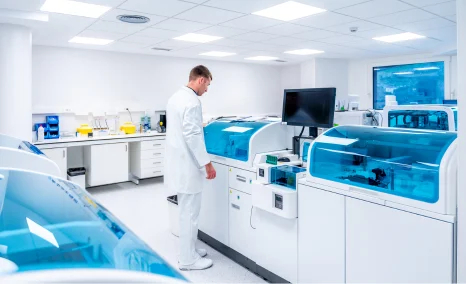Birinapant licensing; AvantGen, IGM pairs up for anti-SARS-CoV-2 antibodies; BeiGene, Novartis to co-dvelop Tislelizumab; Valo raises USD190 M; Bluebird Bio Spins-off
Jan 12, 2021
Table of Contents
Medivir, IGM Biosciences enters into an exclusive licensing agreement for Birinapant
Medivir AB has entered into an exclusive licensing agreement with IGM Biosciences to receive global, exclusive development rights for Birinapant. Birinapant is a clinical-stage SMAC mimetic that degrades Inhibitors of Apoptosis Proteins (IAPs) by binding to them, ultimately leading to cell death in tumor cells.
Further, Birinapant also complements the anti-tumor activity of the immune system. Thus, the drug appears to be a promising therapeutic agent in treating different forms of cancer in combination with other drugs. IGM-8444 is another drug that is currently being tested in a phase I dose-escalation study in patients with solid and hematologic malignancies by IGM Biosciences. It is an IgM antibody targeting Death Receptor 5 (DR5), and IGM is hoping to test Birinapant with IGM-8444 for the treatment of solid cancers later this year.
Downloads
Click Here To Get the Article in PDF
Recent Articles
As per the terms and conditions of the agreement, Medivir is eligible to receive an upfront payment of USD 1 million, followed by an additional USD 1.5 million after Birinapant successfully becomes a part of the Phase I trials. Medivir is also eligible to receive milestone payments up to a total of approximately USD 350 million, plus tiered royalties up to mid-teens on net sales upon the commercial approval of the drug.
AvantGen Enters into a Licensing Agreement for its Anti-SARS-CoV-2 Antibodies with IGM Biosciences
AvantGen has announced the licensing of a panel of its anti-SARS-CoV-2 antibody clones to IGM Biosciences for COVID-19 therapy development. It is a panel of high-affinity human monoclonal antibody clones, which binds to two distinct epitopes on the receptor-binding domain of the SARS-CoV-2 spike protein, thereby blocking the spike protein from interacting with ACE2. This eventually averts virus-induced cell-killing, also known as cytopathic effect.
Under the licensing agreement, IGM Biosciences receives the rights to convert the antibody clones into IgA or IgM format for further development for the treatment of COVID-19. While AvantGen received an upfront payment and is eligible to receive milestone and royalty payments.
The companies believe that their candidate in its original IgG format has shown potent neutralization activity in in vitro assays and in an in vivo animal model. This will have an advantage over the multiple vaccines that have been getting EUA, which are not suitable for immunocompromised patients.
BeiGene, Novartis partner to develop cancer drug Tislelizumab, an Anti-PD-1 Antibody
BeiGene has announced the collaboration with Novartis Pharma AG to develop, manufacture, and commercialize BeiGene’s anti-PD-1 antibody tislelizumab in the United States, Canada, Mexico, member countries of the European Union, United Kingdom, Norway, Switzerland, Iceland, Liechtenstein, Russia, and Japan.
Already in markets in China, BeiGene’s Tislelizumab is a humanized IgG4 anti-PD-1 monoclonal antibody specifically designed to minimize binding to FcγR on macrophages. It is approved for classical Hodgkin’s lymphoma (cHL) following at least two prior therapies and locally advanced or metastatic urothelial carcinoma (UC) with PD-L1 high expression.
The duo will jointly develop the therapy, conducting clinical trials globally. BeiGene is eligible to receive an upfront cash payment of USD 650 million, up to USD 1.3 billion upon achieving regulatory milestones, USD 250 million for sales milestones, and royalties on future sales of tislelizumab in the licensed territory. At the same time, Novartis will take care of regulatory submissions after a transition period and for commercialization upon regulatory approvals. Besides, BeiGene has an option to co-detail the product in North America, which will be funded in part by Novartis.
Valo Raises USD 190 Million in Series B Financing and Unveils Select Therapeutic Programs
Valo has announced the closing of a USD 190 million Series B financing and unveiled select therapeutic programs. The company is creating a new systemic approach for drug discovery and development. The proceeds from Series B will continue to support the discovery and development of therapeutic programs that the company is undertaking. Further, Valo plans to use the sum to advance its proprietary Opal Computational Platform and its build working capital.
The company plans to combine its unique human-centric dataset (over 125-million patient-years) with its Opal Computational PlatformTM with an aim to leverage machine learning and patient data for the facilitated and speedy development of products at clinical stages. Some of the key preclinical programs that Valo proudly owns include NAMPT, PARP1, USP28, and HDAC3.
The financing was led by The Public Sector Pension Investment Board (PSP Investments), along with Valo’s existing major investors, including Flagship Pioneering and several new institutional investors, including Invus Public Equities, HBM Healthcare Investments, Atinum Investment, and Mirae Asset Capital.
Bluebird spins off to two companies, cleaving off its gene therapy, and cancer units
Bluebird bio recently announced its plans to split its genetic disease and oncology businesses. The company has decided to prioritize its severe genetic disease unit and form its oncology business into a new company.
The decision came after the company struggled to commercialize its gene therapies, and as a result, its stocks continue to stumble down. Recently, bluebird bio decided against filing for USFDA approval for its gene therapy, bb1111, a LentiGlobin treatment for sickle cell disease (SCD), for at least a minimum of 2 years. Thus, the company decided to separately focus on different units and make better decisions for commercial manufacturing.
The Genetic Disease unit will focus on Core 3 therapies in beta-thalassemia, cerebral adrenoleukodystrophy, and SCD in the U.S. and Europe. While the new oncology company will work on its B-cell maturation antigen (BCMA) directed chimeric antigen receptor (CAR) T cell therapy ide-cel in multiple myeloma and on bb21217, as well as an oncology pipeline for non-Hodgkin’s lymphoma, acute myeloid leukemia, next-generation multiple myeloma, and solid tumors.
Downloads
Article in PDF
Recent Articles
- Metachromatic Leukodystrophy (MLD): A Rare Indication with great unmet medical need
- Business cocktail
- Bristol Myers’ psoriasis drug; GW Pharmaceuticals eyes US market for Nabiximols; Karyopharm...
- Hologic complements Focal; Allogene for IPO; Gamida, Novartis-backed cell therapy startup; Aduro ...
- Flagship Pioneering launches Omega Therapeutics; EU nod to Vitrakvi; Bluebird Bio reveals positiv...




